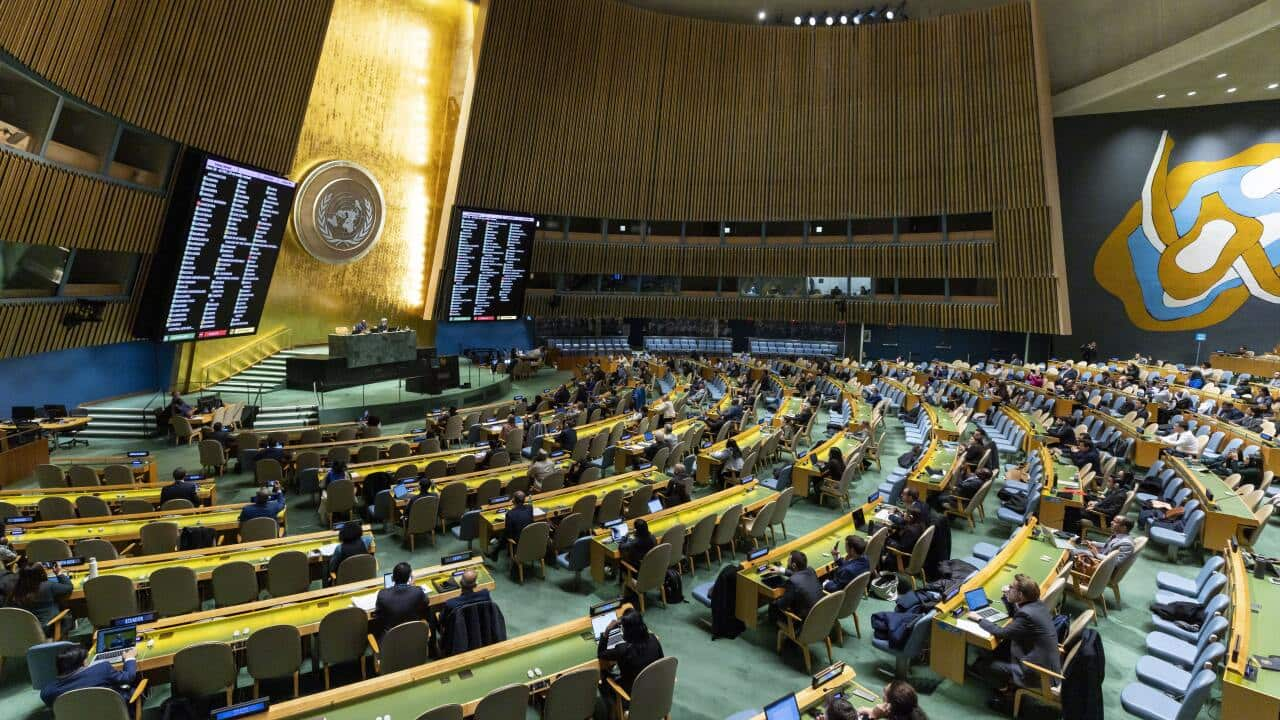Key Points
- Australia has backed a UN motion calling for immediate ceasefire in Gaza.
- Israel, the US, and seven other countries voted against the resolution.
- Australia also backed a resolution supporting the work of the UN relief agency UNRWA.
Australia has backed a United Nations resolution demanding “an immediate, unconditional, and permanent ceasefire in Gaza” and the release of all hostages held by the Palestinian militant group Hamas.
The ceasefire demand is an escalation by the 193-member UN General Assembly, which in October last year called for and then — two months later — demanded an immediate humanitarian truce in Gaza and the release of all hostages.
The resolution passed overwhelmingly with the support of 158 countries, including key Australian allies, the United Kingdom, New Zealand, and Canada. Israel, the US, and seven other nations voted against it.
Australia was also among 159 nations to back a separate resolution deploring in Israel and occupied Palestinian territories from late January.
It demanded that Israel respect UNRWA’s mandate and “enable its operations to proceed without impediment or restriction”. Israel, the US, and seven other countries voted against the resolution.
The Australia Palestine Advocacy Network praised the vote, saying it was a “crucial step” in standing up against the “brutal violence” Israel has inflicted on Palestinians.
Israel has bombarded Gaza since Hamas’ October 7 attack last year in which more than 1,200 people were killed and over 250 hostages taken, according to the Israeli government. More than 44,000 people have been killed in Gaza since October 7, according to the health ministry in Gaza.
The October 7 attack was a significant escalation in the long-standing conflict between Israel and Hamas.
But the Executive Council of Australian Jewry was critical, labelling the ceasefire resolution “immoral” and that the federal government’s decision to support the vote was “a mark of shame”.
“Although the resolution calls for the ‘immediate and unconditional release of all hostages’, it does not make the release of the hostages interdependent with the ceasefire and does not require Hamas to lay down its arms,” the peak Jewish body’s president Daniel Aghion said in a statement.
“Nor does the resolution condemn Hamas for initiating the war on October 7, 2023 or for its many atrocities.”
‘No role for terrorists in Gaza’s future governance’
UN General Assembly resolutions are not binding but carry political weight, reflecting a global view on the Hamas-Israel war.
Australia’s UN representative James Larsen said despite that country’s support of the resolutions, it “does not agree with everything” in them.
He said in addition to the calls for the “immediate and unconditional release of all hostages,” the ceasefire resolution should have condemned Hamas’ actions and required it to lay down its arms.
“There can be no role for terrorists in the future governance of Gaza,” he said.
Larsen also expressed Australia’s grave concern over Israel’s UNRWA ban, saying limiting the agency’s operations “will only exacerbate an already terrible humanitarian crisis”.
“Australia reiterates calls for the protection of humanitarian and United Nations personnel, including UNRWA staff, to enable them to perform their lifesaving work,” he said.
“The best protection for humanitarian personnel and civilians is a ceasefire.”
But Larsen urged UNRWA to address any credible allegations against its staff, saying “any involvement or affiliation with terrorist organisations cannot be tolerated”.
after the Israeli government accused some of the agency’s staff of being involved in Hamas’ October 7 attacks. following a UN investigation.
Rising tensions between Israel and Australia
Tensions between Australia and Israel have risen in recent weeks after Australia supported a UN resolution .
On Saturday, Israeli Prime Minister Benjamin Netanyahu accused the Albanese government of holding an “extreme anti-Israeli position”, and said it was “impossible to separate” .
Foreign Minister Penny Wong on Monday reiterated the government’s condemnation of antisemitism, saying “acts of hate have no place in Australia”.
But she also defended Australia backing the call for Israel to end its “unlawful presence” in the occupied Palestinian territories.
“It is not antisemitic to expect that Israel should comply with the international law that applies to all countries,” she said while delivering the University of South Australia’s Hawke Lecture.
“Nor is it antisemitic to call for children and other civilians to be protected, or to call for a two-state solution that enables Israelis and Palestinians to live in peace and security.”
On Thursday, the Opposition’s Home Affairs spokesperson James Paterson accused the government of “gaslighting of the Jewish community while claiming to be concerned about antisemitism”.
“Anthony Albanese should at least have the decency to admit he is trading votes at the UN for votes in the inner city,” he wrote on X.
Earlier, Labor MP Anne Aly warned that conflating Jewish Australians with the actions of the Israeli government “leads us down a very dangerous path”.
“I think we need to be very mindful of the fact that when we talk about Jewish Australians, we’re talking about people who live here in this country who have nothing to do with what is happening in Israel, and we need to separate the two issues and not conflate them,” she told ABC News Breakfast on Thursday morning.
— With reporting by Reuters news agency

